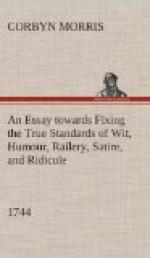Morris first achieved some prominence, though anonymously, with A Letter from a By-stander to a Member of Parliament; wherein is examined what necessity there is for the maintenance of a large regular land-force in this island. This pamphlet, dated at the end, 26 February 1741/42, is a wholehearted eulogy of the Walpole administration and is filled with statistics and arguments for the Mercantilist theories of the day. At the time there was some suspicion that the work had been written either by Walpole himself or by his direction. When the Letter from a By-stander was answered by the historian Thomas Carte, an angry pamphlet controversy ensued, with Morris writing under the pseudonym of “A Gentleman of Cambridge.” Throughout, Morris showed himself a violent Whig, bitter in his attacks on Charles II and the non-jurors; and it was undoubtedly this fanatical party loyalty which laid the foundation for his later government career.
The principal facts of Morris’s later life may be briefly summarized. On 17 June 1743 he was admitted at the Inner Temple. Throughout the Pelham and Newcastle administrations he was employed by the government, as he once put it, “in conciliating opponents.” From 1751 to 1763 be acted as Secretary of the Customs and Salt Duty in Scotland, in which post he was acknowledged to have shown decided ability as an administrator. From 1763 to 1778 he was one of the commissioners of customs. He died at Wimbledon 22 December 1779 (Musgrave’s Obituary), described in the Gentleman’s Magazine as a “gentleman well known in the literary world, and universally esteemed for his unwearied services and attachment to government.”
Throughout his long years of public service he wrote numerous pamphlets, largely on economic and political questions. Merely the titles of a few may be sufficient to indicate the nature of his interests. An Essay towards Deciding the Question whether Britain be Permitted by Right Policy to Insure the Ships of Her Enemies (1747); Observations on the Past Growth and Present State of the City of London (containing a complete table of christenings and burials 1601- 1750) (175l); A Letter Balancing the Causes of the Present Scarcity of Our Silver Coin (1757).
It would be a mistake, however, to consider Morris merely as a statistical economist and Whig party hack. A gentleman of taste and wit, the friend of Hume, Boswell, and other discerning men of the day, he was elected F.R.S. in 1757, and appears to have been much respected. In later life Morris had a country place at Chiltern Vale, Herts., where he took an active delight in country sports. One of his late pamphlets, not listed in the D.N.B. account of him, entertainingly illustrates one of his hobbies. The Bird-fancier’s Recreation and Delight, with the newest and very best instructions for catching, taking, feeding, rearing, &c all the various sorts of SONG BIRDS... containing curious remarks on the nature, sex, management, and diseases of ENGLISH SONG BIRDS, with practical instructions for distinguishing the cock and hen, for taking, choosing, breeding, keeping, and teaching them to sing, for discovering and caring their diseases, and of learning them to sing to the greatest perfection.




